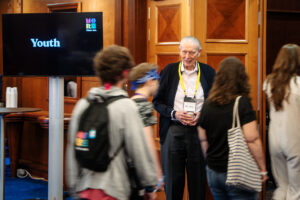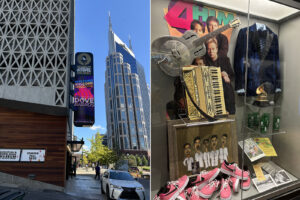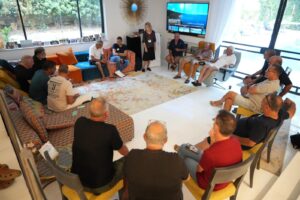
DALLAS (BP)–The executive board of the Baptist General Convention of Texas voted Feb. 24 to no longer receive funds from an Austin church which ordained a homosexual as a deacon.
The board, meeting in Dallas, also asked that University Baptist Church of Austin not state any affiliation with the BGCT on printed materials or on its Internet site.
The vote was described as overwhelming among the board’s 200-plus members in news reports carried by Associated Press and in the Dallas Morning News, Austin American-Statesman and Fort Worth Star-Telegram.
University Baptist, which gave $11,000 through the BGCT last year, can still attempt to send messengers to a BGCT annual meeting, although such an attempt may prove futile after a stance adopted by the convention in 1966 against seating churches that “knowingly endorse sexual practices outside of the biblical vision of marriage.” The Austin Baptist Association disfellowshipped the church in 1995 over its 1994 ordination of the homosexual deacon.
“We are not criticizing their ministry to homosexuals,” said Charles Davenport, pastor of First Baptist Church, Tulia, and chairman of the administrative committee that unanimously recommended the action to the BGCT executive board. “We commend their ministry,” Davenport was quoted by the Austin newspaper as saying.
However, “ministry to is different from affirmation of,” Davenport said, noting the convention’s position: “We are simply saying we believe homosexuality and homosexual practice is contrary to Scripture.”
“I don’t feel very commended for our ministry to gays and lesbians,” University Baptist pastor Larry Bethune was quoted by the Dallas Morning News as saying after the vote. “The convention has an odd way of showing that commendation.”
Bethune said the decision is an attempt by the convention to dictate policy to a local church and sends a “damning message to homosexuals that can only be interpreted as hatred in the name of Christ,” the newspaper reported. The statement adopted by the executive board countered Bethune’s view on church autonomy.
“Under the concept of the autonomy of the local church, the church is, of course, free to take such a posture,” the statement said. “The convention is also free to determine that a church has adopted moral positions related to racism, sexuality, honesty, violence or other moral concerns which are unscriptural.”
And the statement noted that churches should seek to minister to all people, “including those who continue in sinful practices. . We cannot, however, approve of churches’ endorsing homosexual practice as biblically legitimate.” Dee Slocum, an Amarillo pastor and vice president of a breakaway conservative group, Southern Baptists of Texas, told the Fort Worth Star-Telegram he agreed with the state convention’s decision but described it as merely a political move by moderates trying to prove they are not too liberal.
BGCT President Russell Dilday, however, was quoted by the newspaper as responding, “We did not stage this to give us a good image before our conservative critics. We did it because we thought it was the right thing to do.”
Bethune, on the church’s Internet site Feb. 25, wrote, “In spite of private confessions to our church members by BGCT leaders that this action was directly motivated by Fundamentalist pressures upon them, other leaders publicly denied any political motivation to the motion.”
Before the vote, Bethune urged the board to delay action until a “full and meaningful dialogue” could take place with the church. But Dilday, a professor at Baylor University’s Truett Theological Seminary and former president of Southwestern Baptist Theological Seminary in Fort Worth, said the BGCT administrative committee had not acted “in haste or carelessly.” During the discussion, several board members made impassioned pleas citing church autonomy and contending the action failed to show compassion to homosexuals.
According to the Associated Press, the church was disavowed by the Austin Baptist Convention in 1948 when it allowed blacks to sit in the same pews with whites. In the early 1970s, the church was criticized for ordaining women as deacons.
The church has been criticized for stating on its Internet site that it sponsors “Open Circle,” a program for homosexual men and women, the Fort Worth newspaper reported. According to the website, the church welcomes “gay, lesbian, bisexual, straight and transgendered people working toward unity and inclusion in our denomination communities.”
Bethune, in his remarks to the board, according to the Austin newspaper, said, “You may not all agree with the way our church ministers with gays and lesbians and their families — in fact, we don’t all agree at UBC — but we are creating one of the few safe places for your Baptist homosexual children to work out their salvation.”
Board member Gerald Blankenship of Lubbock, however, maintained the convention had to send a clear message about University Baptist’s actions; otherwise, “we’re allowing Satan to crack the very foundation of this church.” University Baptist Church also is listed on the Cooperative Baptist Fellowship’s Internet site under its “CBF Church Links” section. The CBF has no prohition against accepting funds from churches which ordain or marry homosexuals. The CBF, a group of moderate Baptists critical of SBC leadership, receives funds through the missions networking channel of the BGCT.













